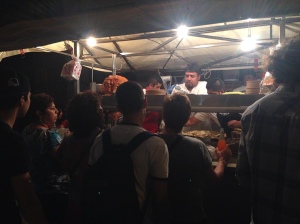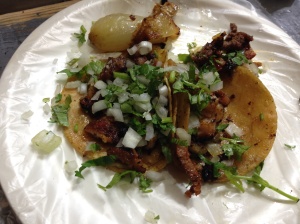Farewell to Mexico. For now.
A ride, a City and Some Bulls
Our car awaits. Carlos drives us past Queretero, Mexico, the town where my husband spent his teen years. It’s where he zoomed out on his dirt bike, just beyond his street, to lay his sleeping bag down, carefully avoiding the cactus, dozing off under the stars. An occasional burro and its owner might pass by in the morning hours, but this was wide open country. Now, out of town has been gobbled up by this huge city, the manufacturing hub of Mexico with skyscrapers and the biggest Mall in Latin America with the best, how-do-you-say,”brands.”
Out of town we pass a mountainous tract, sparsely populated with cactus and an occasional bull, small but muscular in the distance. “They’re bred here to be killed in our fights,” he tells us, “but there are fights for Americanos where there’s no klll at all,”
And so he tell us a driver’s story. It starts in his youth, when he and his pals decide to walk the forty miles from San Miguel de Allende — where he lives and where we are headed — to Queretero. On their way, the band of boys pass march through this area.
Suddenly, band of bulls charging them. So they scrabble up the nearest mesquite tree to safety. But the bulls surround the tree, waiting. And so they sit for five hours in the tree before the ranch’s owner finds them. El Patron hurries them into a large room, where they wait for police to arrive. But instead his staff appears, carrying a large meal, which tastes even better because it is unexpected. And he tells them of his experience as a boy with the charging bulls and a mesquite tree in the field, the same — years before he bought the ranch himself. Their bellies full, he drives them home.
And so I imagine those gorditas, the rustic regional tortillas he fed them. Warm from the griddle, made with coarsely ground masa, thick and corny, fried, then cut open into a pocket. I can taste them, as the boys did, filled with spicy napoles (cooked catus paddles), potatoes and sausage. And so my mouth is set when we arrive in San Miguel.
Tacos Pasteur


We arrive that night, and walk past the square, lined with box cut trees that face a gothic style church that looks like a pink wedding cake. It’s familiar to us, from years of visits, but different now. We have no roots. For years we have been talking, planning and saving. In stages, we’ve sold our home, our cars. We’ve been populating our daughter’s new apartment with our furniture, storing what we hadn’t given away in her basement. Now we are here. Without knowing it, I’m heading towards a flavor to ground me. A stand.
Think Sharma the Lebanese immigrants brought here, with lamb and a yogurt sauce, appropriated by the Mexicans, who season their version their way. Just past the Jardin, the town square, bustling with Mexican tourists, they await. Part of my brain remembers my husband is a recent vegetarian, and so I look his way as we walk. He smiles, knowing me too well: my palette stands alone on this journey, although I do not.
Three men are working the stand, one slicing down long strips of layered pork filling. They are hot, chopping the sliced meat, facing the hungry crowd. And so I jostle forward— dos con todo por favor — which I don’t yell loud enough, and so I’m passed over in the crowd. A young Mexican woman waiting with me, encourages me to scream out my order.
And so my palm sized tacos finally arrive. Tortillas topped with just a bit of smoky pork, an orange sauce of chilies and a fine mix of chopped onions and cilantro, crowned with a slice from the warm pineapple that sits above the meat.
One has to christen Mexico with a taco, and this next chapter has to begin with a good one.
Discado
A week has past. On Friday we are asked to join a birthday party out of town the next day. Discado, a Northern Mexican dish, is traditionally cooked in tractor disk, with ingredients brought in by farmers, who cook it over an open flame. The disk works like a wok with strong, direct heat and frequent stirring. It’s a concoction of onions cooked in bacon, followed by pork and beef, peppers and tomatoes, lightly spiced, finished lots of cheese — all thrown into tortillas. In a mix of hand gestures and Spanglish, I’m told that preparing Discado communally gives it its staying power, enhancing its flavor.
After introductions, I join our host’s friends and family, all of us, chopping together round a long table. We peel grilled poblano chilis and chop ripe tomatoes. Mellow kids and dogs play underfoot to music ranging from Mexicali to American blues, while the sun set over the presa (lake).
Suddenly we’re ready. The table is jammed with oodles of sides, from the expected tomatillo salsa and guacamole to garlicky grilled garden vegetables, charred and chopped, grapefruit sections wrapped in basil leaves and gingered figs from the tree out back, flambeed in tequila and caramelized in sugar. Spanish and with a touch English and French engulfs us as we eat. Wood smoke fills the air as the high desert night grows dark and cool. And so the evening passes.
When it’s late we say our good byes. Not a thank-you-very-much, but one by one, we receive and give a kiss on the cheek. And from three year old Rosa, a sleepy handshake from her warm hand.







